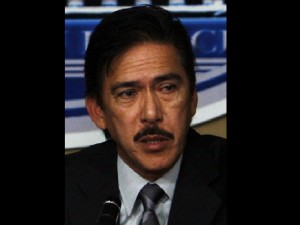Sotto admits he proposed online libel provision
 MANILA, Philippines–The Cybercrime Prevention Act’s provision on online libel wasn’t a last-minute insertion in the bicameral conference. The provision was Senator Vicente Sotto III’s proposal that the Senate approved on the floor without objection in January.
MANILA, Philippines–The Cybercrime Prevention Act’s provision on online libel wasn’t a last-minute insertion in the bicameral conference. The provision was Senator Vicente Sotto III’s proposal that the Senate approved on the floor without objection in January.
Sotto said he pushed for the inclusion of libel on Republic Act No. 10175’s list of computer crimes. But he denied that he did so in retaliation for the “cyberbullying” he received after his turno en contra in August against the reproductive health bill.
“That was my proposal but there was never an insertion. It was done on the floor,” Sotto told the Philippine Daily Inquirer in a telephone interview.
The Senate Journal for Jan. 24 showed that Sen. Edgardo Angara, sponsor of Senate Bill No. 2796, accepted Sotto’s proposal and the Senate approved libel as one of the punishable acts under the cybercrime measure.
Sotto’s proposed amendment defined the cybercrime of libel as “the unlawful or prohibited acts of libel as defined in Article 355 of the Revised Penal Code committed through a computer system or any other similar means which may be devised in the future.”
“As early as the last quarter of 2011, I was already suggesting that we include libel in the issue of cyberspace and cybercrime because of what happened to Rhian Ramos, and GMA [Network] could do nothing [to go after those behind the videos posted on YouTube],” Sotto said.
He also adverted to other Internet video “scandals” involving Katrina Halili, Maricar Reyes and even Ramgen Bautista (Ram Revilla), the late half-brother of Sen. Ramon Revilla Jr.
“I was suggesting that we include libel in the [list of] cybercrimes because there was already abuse,” Sotto said.
He said his suggestion was adopted by a joint Senate committee, including the panel on science and technology and the panel on constitutional amendments, through a provision that covered crimes punishable under the Revised Penal Code.
Libel is punishable under Article 355 of the code.
After Sotto’s amendment was adopted by the Senate, its journal showed that he, as majority leader, moved to close the period of individual amendments.
Afterward, the chamber approved its version of the cybercrime bill without any objection.
In proposing the amendment, Sotto said “that there are numerous abuses in technology, particularly the video and photo uploading and unnecessary write-ups and comments in social networking systems.”
The journal said that Sotto had observed that the publication requirement in the crime of libel could be achieved by the mere fact that it was seen in cyberspace. It was clear, Sotto said, that cybercrimes were not covered under the libel article of the Revised Penal Code.
The journal added that Angara pointed out that cyberspace “is just a new avenue for publicizing or communicating a libelous statement, which is subject to prosecution and punishment as defined by the Revised Penal Code.”
“I’m denying that there was an insertion … that when I was being attacked I made an insertion. They claim that it was in retaliation [over the supposed cyberbullying after the turno en contra against the RH bill],” Sotto told the Philippine Daily Inquirer.
He said his turno en contra and the allegations of plagiarism against him in the social media happened in August and September.
He noted that the Senate ratified the bicameral conference committee report on the cybercrime law as early as June 4.
“As early as Jan. 24, we passed the bill and on June 4 we ratified the bicam [report]. I didn’t attend the bicameral conference. I don’t even remember whether I was a member of the bicam. So what insertion are they talking about,” Sotto said.
“The problem with them is that their minds are quite dirty. They have a propensity for making up things. Somebody comes up with a tweet, everybody believes the tweet,” he said of his critics.














